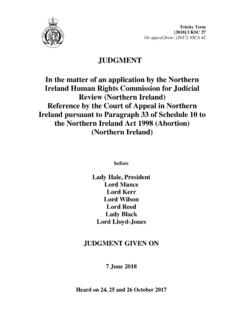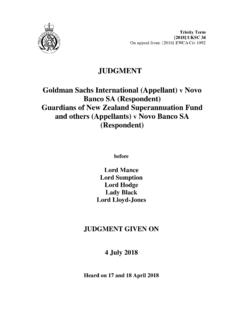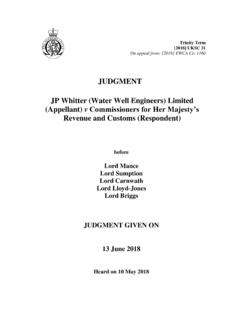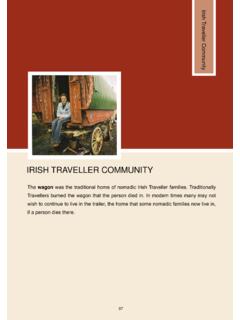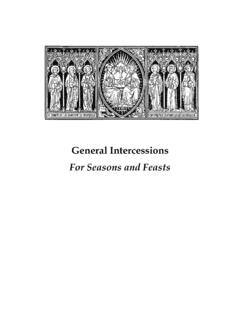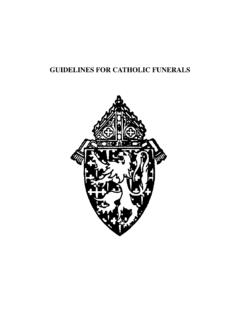Transcription of R (on the application of Nicklinson and another ...
1 Trinity Term [2014] UKSC 38 On appeal from: [2013] EWCA Civ 961 JUDGMENT R (on the application of Nicklinson and another ) (Appellants) v Ministry of Justice (Respondent) R (on the application of AM) (AP) (Respondent) v The Director of Public Prosecutions (Appellant) R (on the application of AM) (AP) (Respondent) v The Director of Public Prosecutions (Appellant) before Lord Neuberger, President Lady Hale, Deputy President Lord Mance Lord Kerr Lord Clarke Lord Wilson Lord Sumption Lord Reed Lord Hughes JUDGMENT GIVEN ON 25 June 2014 Heard on 16-19 December 2013 Appellant ( Nicklinson and Lamb) Respondent (Ministry of Justice) Paul Bowen QC David Perry QC Guy Vassall-Adams James Strachan QC (Instructed by Bindmans LLP) (Instructed by Treasury Solicitors) Appellant (DPP) Respondent (AM)
2 John McGuinness QC Phillip Havers QC Duncan Atkinson Adam Sandell (Instructed by CPS Appeals Unit) (Instructed by Leigh Day & Co) Intervener (CNK Alliance Ltd (Care Not Killing)) Intervener (Dignity and Choice in dying ) Charles Foster Lord Pannick QC Ben Bradley Katarina Sydow (Instructed by Barlow Robbins LLP) Ravi Mehta (Instructed by Baker & McKenzie LLP) Intervener (British Humanist Association) Heather Rogers QC Caoilfhionn Gallagher Maria Roche (Instructed by Irwin Mitchell LLP) LORD NEUBERGER 1. These appeals arise out of tragic facts and raise difficult and significant issues, namely whether the present state of the law of England and Wales relating to assisting suicide infringes the European Convention on Human Rights, and whether the code published by the Director of Public Prosecutions ( the DPP ) relating to prosecutions of those who are alleged to have assisted a suicide is lawful.
3 2. The appeals arise out of claims brought by three men, Tony Nicklinson , Paul Lamb and someone known for the purpose of these proceedings as Martin, each of whom was suffering such a distressing and undignified life that he had long wished to end it, but could not do so himself because of his acute physical incapacity. Mr Lamb contends that the law should permit him to seek assistance in killing himself in this country, and, if it does not, it should be changed so as to enable him to do so. He is supported by the widow of Mr Nicklinson , who has died since the proceedings were issued. Martin s case is that there should be clearer guidance in the policy published by the DPP with regard to prosecuting those from whom he would like advice and assistance in connection with killing himself.
4 An outline of the facts 3. The first appeal arises from the fact that Mr Nicklinson suffered a catastrophic stroke eight or nine years ago, when he was aged 51. As a result, he was completely paralysed, save that he could move his head and his eyes. He was able to communicate, but only laboriously, by blinking to spell out words, letter by letter, initially via a perspex board, and subsequently via an eye blink computer. Despite loving and devoted attention from his family and carers, his evidence was that he had for the past seven years consistently regarded his life as dull, miserable, demeaning, undignified and intolerable , and had wished to end it. 4. Because of his paralysed state, Mr Nicklinson was unable to fulfil his wish of ending his life without assistance, other than by self-starvation, a potentially protracted exercise, involving considerable pain and distress.
5 His preference was for someone to kill him by injecting him with a lethal drug, such as a barbiturate, but, if that was not acceptable, he was prepared to kill himself by means of a machine invented by Philip Nitschke, an Australian doctor. This machine, after being loaded with a lethal drug, could be set up so as to be digitally activated by Mr Nicklinson , using a pass phrase, via an eye blink computer. Page 2 5. Because he was told that it would be unlawful for someone to kill him or even to assist him in killing himself, Mr Nicklinson applied to the High Court for (i) a declaration that it would be lawful for a doctor to kill him or to assist him in terminating his life, or, if that was refused, (ii) a declaration that the current state of the law in that connection was incompatible with his rights under article 8 of the Convention.
6 6. While expressing great sympathy and respect for Mr Nicklinson s situation and wishes, the High Court, in an impressive judgment given by Toulson LJ, with whom Royce and Macur JJ agreed, refused him both forms of relief [2012] EWHC 2381 (Admin). Following that decision, Mr Nicklinson embarked on the very difficult and painful course of self-starvation, refusing all nutrition, fluids, and medical treatment, and he died of pneumonia on 22 August 2012. 7. Mr Nicklinson s wife, Jane, was then both added (because she contended that she had a claim in her own right) and substituted (in her capacity as administratrix of Mr Nicklinson s estate) as a party to the proceedings, and pursued an appeal to the Court of Appeal. The Court of Appeal, while again sympathetic and respectful of her position, dismissed her appeal for reasons given in a similarly impressive judgment by Lord Dyson MR and Elias LJ, with whom Lord Judge CJ agreed [2013] EWCA Civ 961; [2014] 2 All ER 32.
7 8. Because it was feared that there might be a challenge to Mrs Nicklinson s right to pursue an appeal, Paul Lamb was added as a claimant in the proceedings before the hearing in the Court of Appeal. Since a catastrophic car crash in 1990, Mr Lamb has been completely immobile, save that he is able to move his right hand. He requires carers 24 hours a day, suffers pain every day, and is permanently on morphine. His condition is irreversible, and he wishes a doctor to end his life, which he regards as consisting of a mixture of monotony, indignity and pain. He therefore applied for the same relief as Mr Nicklinson had sought, and it was similarly refused by the Court of Appeal. 9. The second appeal arises from the fact that Martin (who wishes to be so described in order to maintain his privacy) suffered a brainstem stroke in August 2008, when he was 43.
8 He is almost completely unable to move and can only communicate thorough slow hand movements and via an eye blink computer. His condition is incurable, and, despite being devotedly looked after by his wife and carers, his evidence is that he wishes to end his life, which he regards as undignified, distressing and intolerable, as soon as possible. 10. Apart from self-starvation, Martin s only way of achieving this is by travelling to Zurich in Switzerland to make use of the Dignitas service, which, Page 3 lawfully under Swiss law, enables people who wish to die to do so. However, he first needs (i) to find out about this service, (ii) to join Dignitas, (iii) to obtain his medical records, (iv) to send Dignitas money, and (v) to have someone accompany him to Zurich.
9 For understandable reasons, his wife does not want to be involved, and he does not want to involve any other member of his family, in this project. So, as he says, he needs assistance from one of his carers or from an organisation such as Friends At The End. 11. Martin began proceedings seeking an order that the DPP should clarify, and modify, his published Policy for Prosecutors in respect of Cases of Encouraging or Assisting Suicide , published in February 2010 ( the 2010 Policy ) and other relief. He seeks the clarification and modification to enable responsible people, including, but not limited to, carers who are willing to do so, to know that they could assist Martin in committing suicide through Dignitas without the risk of being prosecuted. 12. Martin s proceedings were heard together with those brought by Mr Nicklinson , and they failed in the High Court.
10 A few months later, he embarked on an attempt to end his life by self-starvation, but abandoned it in distressing circumstances. Martin s appeal, which was heard together with that of Mrs Nicklinson and Mr Lamb, was partially successful, in that Lord Dyson and Elias LJ considered that, in certain respects , the 2010 Policy was not sufficiently clear .. in relation to healthcare professionals [2013] EWCA Civ 961, para 140; [2014] 2 All ER 32. Lord Judge CJ took a different view, and would have dismissed Martin s appeal. 13. The Court of Appeal gave Mrs Nicklinson and Mr Lamb ( the appellants ) permission to appeal to the Supreme Court in the first appeal. In the second appeal, the Court of Appeal gave the DPP permission to appeal, and Martin permission to cross-appeal, as he contends that the order of the Court of Appeal in his case does not go far enough.

